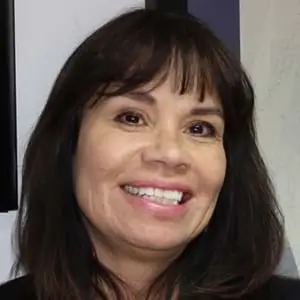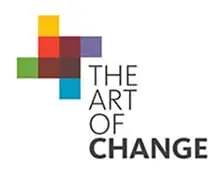Lori Pourier

Lori Pourier grew up on the Pine Ridge Reservation and is a member of the Oglala Lakota tribe. She heads First Peoples Fund (FPF), a 17-year-old national Native nonprofit that works with culture bearers and artists in Indigenous communities. FPF provides professional training workshops for Native artists and works with national community development finance institutions to train business coaches on how to work with Native artists. FPF also provides fellowship for Native artists to help them grow and improve their businesses.
Transcript
[The words “Art Is” appear, followed by scrolling words…Empathy, Political, Hope, Powerful, Connection…it stops at Identity. Art Is Identity.]
Lori Pourier, president of First Peoples Fund: In my community artists are those who are standing up for the rights to protect their land, to reclaim their songs, their ceremonies, their dances.
[Tribal members sing together while dressed in their regalia.]
My name is Lori, I’m Oglala Lakota. And I work for First People’s Fund. Much of my work is spent educating about artists of tribal communities.
[A Cherokee Nation woman displays her woven baskets made from river cane. A Hawaiian man weaves a frog out of ancient laulala materials.]
In order for us to truly embrace history and our identity, we have to acknowledge that American Indians hold the original title to this land. There’s over 567 nations. Less than .02 percent of all philanthropy goes to Indian Country.
[A group of young people of Tlingit ancestry dance. A native woman sings and strikes a drum in a solo performance.]
Artists are the changemakers in our communities nationally and so artists restore history and our identity.
[The words “Art is” appear, followed by scrolling words…Identity, Expression, Change, Creativity, Healing…it stops at Justice. Hashtag Art Is Justice. Agree? Share this video.]
[Ford Foundation logo: a globe made up of a series of small, varied circles.]
Accessibility Statement
- All videos produced by the Ford Foundation since 2020 include captions and downloadable transcripts. For videos where visuals require additional understanding, we offer audio-described versions.
- We are continuing to make videos produced prior to 2020 accessible.
- Videos from third-party sources (those not produced by the Ford Foundation) may not have captions, accessible transcripts, or audio descriptions.
- To improve accessibility beyond our site, we’ve created a free video accessibility WordPress plug-in.
Pourier has been involved in the arts, social justice, and community development fields for 27 years. Her early work began at First Nations Development Institute and the International Indigenous Women’s Network, and she has served as president of the First Peoples Fund since 1999. Dedicated to a vision of strengthening Native communities through culture and arts for much of her life, Pourier focuses her efforts on helping to enhance Native communities and bringing new philanthropic resources to Native artists and culture bearers directly. She received the Center for Social Innovation Fellowship at Stanford Graduate School of Business and was recently named one of four Native women leading change in Native communities by the Johnson Scholarship Foundation. The Foundation noted that Pourier is “a leader in the field—not just for Native arts and culture—but arts and culture period. She is the go-to person for the ‘creative economy’ in Indian Country.”
Pourier holds an MS from Southern New Hampshire University’s School of Business. She lives in Rapid City, South Dakota.
